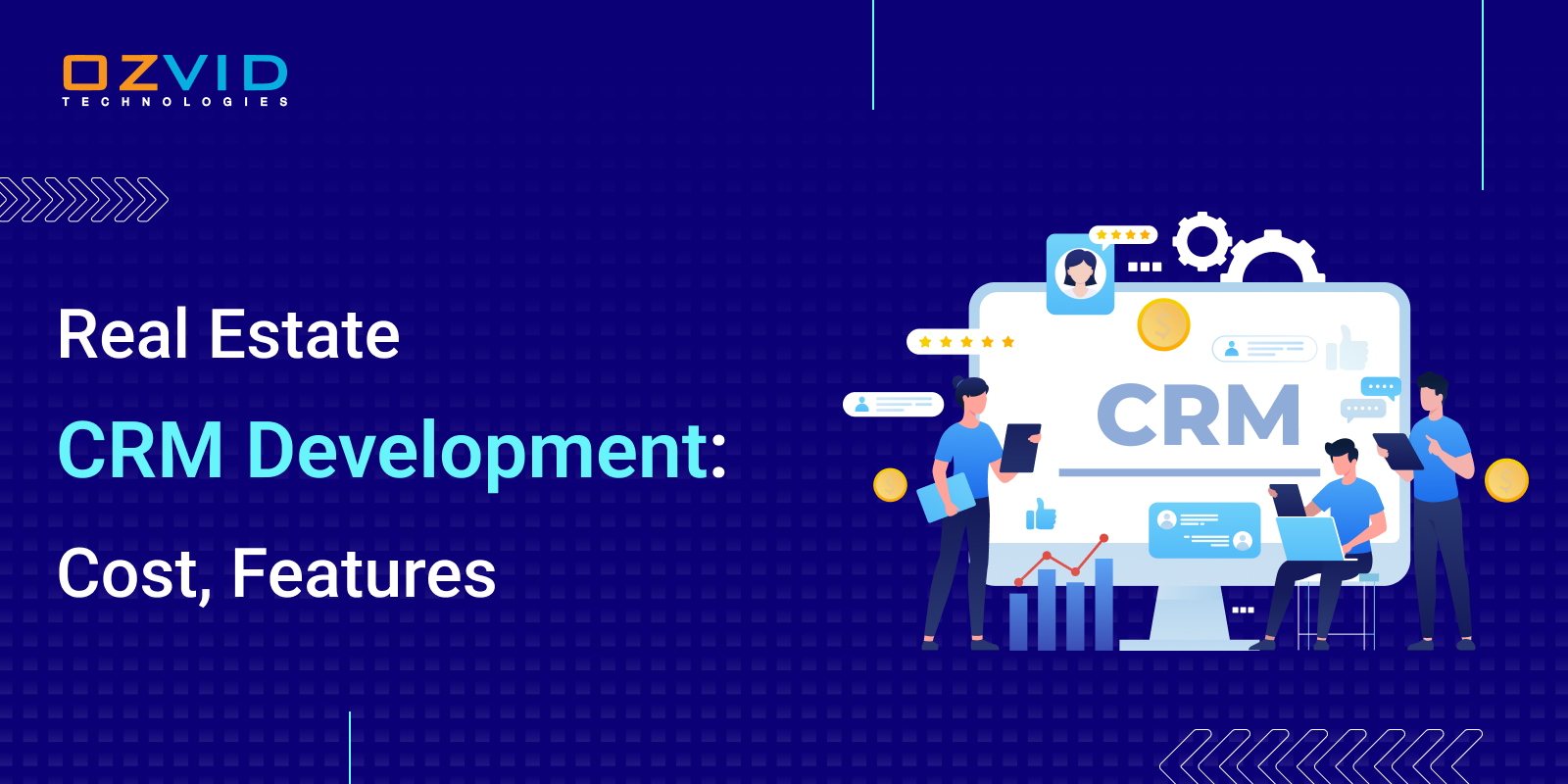- Jan 21, 2025
Share this post on:

In today's highly competitive real estate market, keeping up with client expectations, managing numerous leads, and maintaining smooth operations can often be a challenge. Real Estate CRM (Customer Relationship Management) systems have emerged as one of the most effective solutions to streamline these operations. With the help of a powerful CRM, real estate businesses can manage leads, track sales, monitor property listings, and provide personalized experiences to clients, all from a centralized platform.
Ozvid Technologies, a leading IT service provider, offers state-of-the-art real estate CRM development services to cater to the unique needs of the industry. This blog explores the key features, benefits, and cost considerations associated with real estate CRM development, with a specific focus on the services provided to the industries.
Key Takeaways
CRM Benefits: Helps manage leads, track sales, organize property listings, and enhance customer service from a centralized platform.
Features: Includes lead management, property listings, email marketing automation, reporting, task scheduling, mobile access, and third-party integrations.
Cost Factors: Cost depends on customization, features, platform, integrations, and support. Basic CRMs may cost a few thousand dollars, while advanced systems can reach tens of thousands.
Efficiency: Real estate CRMs save time, improve client relationships, and streamline operations, leading to better business performance.
What is Real Estate CRM?
Real Estate CRM is a specialized software that helps real estate agents and firms manage their relationships with clients, track leads, automate communication, and streamline sales processes. Unlike generic CRM systems, real estate CRMs are designed to address the unique challenges of the real estate industry, including managing multiple properties, keeping track of customer inquiries, scheduling property viewings, and dealing with complex sales cycles.
A real estate CRM system can assist agents in building strong relationships with their clients, improving operational efficiency, and boosting overall sales performance.
Why Do Real Estate Companies Need a CRM?
The real estate industry is dynamic and fast-paced, requiring professionals to juggle multiple tasks simultaneously. Without an efficient CRM development services, real estate agents can easily lose track of valuable leads, miss follow-ups, or struggle to provide clients with the information they need in a timely manner. Some of the key reasons why real estate companies need a CRM include:
Centralized Information:
A CRM consolidates customer data, property details, and communication logs into one unified platform, making it easy for agents to access and manage information.
Lead Management:
Real estate CRM software helps in capturing, nurturing, and converting leads by tracking interactions and setting automated reminders for follow-ups.
Better Customer Service:
A CRM allows real estate professionals to better understand their clients’ preferences, improving the quality of interactions and enhancing customer satisfaction.
Time Efficiency:
By automating various tasks such as email marketing, appointment scheduling, and follow-up reminders, a CRM saves valuable time for agents, enabling them to focus on closing deals.
Reporting and Analytics:
Real estate CRMs offer built-in reporting tools to track sales performance, lead conversion rates, and other key performance indicators (KPIs).
Features of Real Estate CRM
Building custom real estate CRM systems that cater to the specific requirements of real estate businesses. With years of experience in CRM development, they provide a highly scalable and feature-rich platform that ensures maximum productivity and growth for real estate companies.
Here are the key features of the Real Estate CRM:
1. Lead Management System
One of the primary features of real estate CRM is its advanced lead management system. This system enables real estate agents to capture, track, and nurture leads efficiently. The CRM automatically collects leads from various channels (websites, social media, email, etc.) and organizes them in a centralized dashboard. The system also allows for lead segmentation, ensuring that each lead receives the appropriate attention.
2. Property Listings Management
The real estate CRM provides an intuitive property listing management system. Agents can add, update, and manage property listings with ease. The CRM also allows for photo uploads, detailed descriptions, and the addition of key property features such as price, square footage, and location. This feature helps agents present properties to clients more effectively and stay organized while managing multiple listings.
3. Client and Contact Management
With Ozvid Technologie's real estate CRM, professionals can maintain a comprehensive database of clients and contacts. The CRM allows users to store detailed information, such as contact details, communication history, preferences, and transaction history. This helps agents provide a more personalized experience for each client, which can significantly improve customer satisfaction and retention.
4. Task and Appointment Scheduling
The CRM includes a built-in task and appointment scheduling feature that helps agents stay organized and efficient. Users can create tasks, set deadlines, and receive reminders for important follow-ups. This ensures that no lead or client is forgotten and that agents always stay on top of their work.
5. Email Marketing Automation
Email marketing plays a crucial role in real estate marketing, and offers automated email marketing features within their CRM. Real estate professionals can create custom email templates, send personalized emails to leads, and track open rates and responses. This automation reduces manual effort and ensures that marketing campaigns are timely and effective.
6. Reporting and Analytics
The CRM comes with a powerful analytics and reporting dashboard. Real estate professionals can generate reports on lead conversion rates, sales performance, and overall business metrics. This data-driven approach enables agents and managers to make informed decisions and track the success of their marketing strategies.
7. Mobile Access
With the increasing use of smartphones, having access to a CRM on the go is critical for real estate agents. Be ensures that their CRM is mobile-responsive, meaning agents can access important information, respond to leads, and schedule appointments from their smartphones or tablets. This mobility adds to the flexibility and convenience of using the CRM.
8. Integration with Third-party Applications
Real estate CRM can be integrated with a variety of third-party applications and platforms, such as email marketing tools, social media platforms, and accounting software. These integrations allow for seamless data flow across different systems, making it easier to manage the entire business process in one place.
9. Document Management
Managing documents is an essential part of the real estate business, and CRM simplifies this process. The system enables agents to store and organize documents related to properties and clients. This could include contracts, agreements, floor plans, and images, all in a secure and accessible format.
10. Customizable Dashboards
Real estate CRM is highly customizable, offering tailored dashboards that reflect an agent's or team’s unique needs. Whether it's sales performance, lead generation, or customer data, users can configure their dashboard to display the information that matters most to them.
Cost of Real Estate CRM Development
The cost of real estate CRM development can vary depending on the specific requirements of the business and the complexity of the features involved. However, we offers highly competitive pricing for their CRM development services. Here are the factors that affect the cost of CRM development:
1. Customization
One of the main factors that impact the cost is the level of customization required. If a business needs highly tailored features and functionality, it will cost more to develop compared to a basic CRM. Companies works closely with clients to understand their specific needs and offers tailored CRM solutions at cost-effective prices.
2. Features
The number and complexity of the features that a real estate business needs will influence the overall cost. Features such as lead management, property listings, and email marketing automation can add to the development cost, especially if advanced features are needed.
3. Platform
Real estate CRM systems can be developed for various platforms, such as web-based, mobile-based, or desktop applications. If you require mobile apps or multi-platform access, this will increase the development costs.
4. Integration with Third-party Software
If the CRM needs to be integrated with other systems (e.g., email marketing tools, property listing services, or accounting software), the cost of these integrations should be considered. Companies provides integration services to ensure smooth data flow across all business tools.
5. Support and Maintenance
After the CRM has been developed, ongoing support and maintenance are necessary to ensure it continues running smoothly. We offers post-launch support, and this ongoing service will add to the overall cost.
In general, the cost of developing a real estate CRM can range from a few thousand dollars for a basic CRM system to tens of thousands of dollars for a fully custom-built CRM with advanced features and integrations. The best way to get an accurate estimate is to consult Ozvid Technologies directly and discuss your project’s specific needs.
Conclusion
Real estate CRM systems are essential tools for modern real estate professionals, helping them manage leads, enhance customer relationships, and drive sales growth. We offers a feature-rich, customizable, and affordable CRM development solution tailored specifically for the real estate industry. By choosing Ozvid Technologies for your real estate CRM development, you can ensure your business stays competitive in a fast-evolving market.
If you're ready to streamline your real estate business operations and enhance customer service with a powerful CRM, reach out to Ozvid Technologies today to learn more about how they can help you transform your business.
FAQ's
What factors affect the cost of developing a Real Estate CRM?
The cost of developing a Real Estate CRM depends on factors such as the complexity of features, customization requirements, the number of users, integrations with third-party systems (e.g., MLS, email platforms), and the development team’s expertise. A simple CRM may cost around $10,000–$30,000, while a fully customized, feature-rich CRM could range from $50,000 to $150,000 or more.
What are the key features of a Real Estate CRM?
Key features of a Real Estate CRM include lead management, contact management, property listing management, email marketing automation, task and calendar management, document storage, reporting and analytics, and integration with MLS. Additional advanced features may include AI-based recommendations, transaction management, and communication tools for better client engagement.
How long does it take to develop a Real Estate CRM?
The development timeline for a Real Estate CRM depends on the complexity of the app and the specific features required. A basic CRM may take around 2-3 months to develop, while a more advanced, customized solution could take 6-12 months. Regular testing, design iterations, and integrations may also impact the overall timeline.
Is it better to build or buy a Real Estate CRM solution?
Deciding between building or buying a Real Estate CRM depends on your business needs. If your requirements are highly specific and unique, building a custom CRM offers flexibility and scalability. However, if your needs are standard, purchasing an off-the-shelf CRM could be more cost-effective and faster to implement. Both options have pros and cons depending on budget and customization needs.










